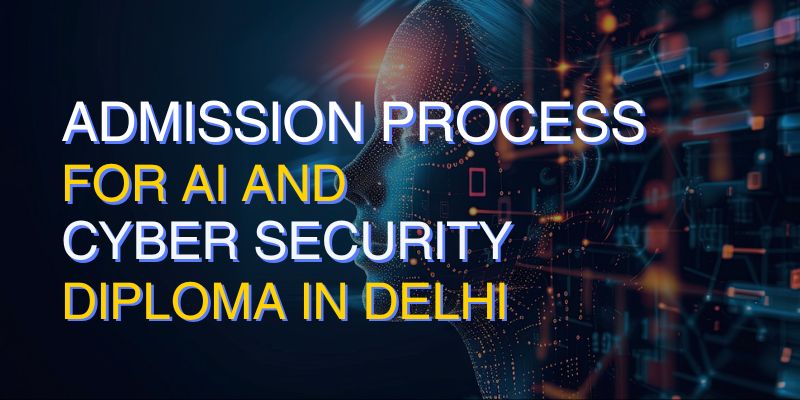Diploma in AI and Information Security in Delhi
In today’s rapidly evolving tech landscape, Artificial Intelligence (AI) and Information Security are among the most sought-after skills across industries. With cyber threats growing exponentially and AI redefining how data is processed, stored, and protected, professionals trained in both areas are in high demand. If you’re looking to break into this powerful career domain, enrolling in a Diploma in AI and Information Security in Delhi, India could be the ideal path forward.
Delhi, being a national hub for technology and education, offers some of the best AI and information security diploma training institutes that combine theoretical knowledge with hands-on diploma training in AI and security to prepare you for real-world challenges.
Your Future Starts Here – Reserve Your FREE Demo Class Now!
What is Artificial Intelligence (AI)?
Artificial Intelligence is the simulation of human intelligence by machines. It enables systems to learn from data, identify patterns, make decisions, and even predict future outcomes. AI includes technologies like:
- Machine Learning (ML)
- Natural Language Processing (NLP)
- Computer Vision
- Neural Networks
- Robotics and Automation
AI helps in automating tasks, improving efficiency, and making smarter systems in sectors like finance, healthcare, defense, retail, and cybersecurity.
What is Information Security?
Information Security involves protecting data and information systems from unauthorized access, misuse, or cyberattacks. It ensures the confidentiality, integrity, and availability (CIA) of digital data. Key components include:
- Network Security
- Cyber Threat Detection
- Encryption and Authentication
- Security Operations Center (SOC) Monitoring
- Ethical Hacking and Penetration Testing
It is a critical domain for businesses, governments, and individuals to secure sensitive data from hackers and cybercriminals.
How Do AI and Information Security Work Together?
In today’s evolving digital ecosystem, Artificial Intelligence (AI) and Information Security are merging to create more proactive, intelligent, and automated defense systems. As cyber threats become more complex and dynamic, traditional security methods alone are no longer sufficient. This is where AI steps in to revolutionize cybersecurity operations.
1. AI Enhances Threat Detection Capabilities
AI can analyze vast amounts of data from various sources in real-time to detect suspicious behavior or anomalies. Traditional systems rely on predefined rules, while AI-powered systems learn from patterns and adapt continuously. This helps detect zero-day vulnerabilities, malware, and phishing attacks before they can cause harm.
Example: AI can spot a login attempt from an unusual location or time, and flag it before the system is compromised.
2. Predictive Analysis and Threat Intelligence
Machine Learning (ML), a branch of AI, enables security systems to predict threats before they occur. By studying historical attack data and current trends, AI models can forecast potential breach points and alert teams in advance, helping businesses take preemptive actions.
Example: AI can identify which types of endpoints are most vulnerable and automatically assign patches or updates.
3. Automated Incident Response
AI can automate response protocols when a threat is detected. Instead of waiting for human intervention, AI systems can isolate affected systems, block IPs, or shut down compromised processes to prevent the spread of malware.
Example: If a ransomware attack is detected, AI tools can quickly back up clean files and disconnect infected systems.
4. Advanced Behavioral Analytics
Artificial Intelligence (AI) helps build behavioral profiles of users and systems. If there’s any deviation — like accessing files never opened before or unusual data transfers — the system can immediately flag or block it. This approach is called User and Entity Behavior Analytics (UEBA).
Example: AI can prevent insider threats by spotting abnormal file access patterns.
5. Enhanced Security in Biometric Authentication
AI strengthens facial recognition, fingerprint scanning, and voice recognition systems, making access control more robust. Deep learning algorithms can recognize and adapt to changes over time, improving both accuracy and security.
Example: AI can detect spoofing attempts during facial recognition scans.
6. Continuous Monitoring & SOC Automation
In Security Operations Centers (SOC), AI enables continuous monitoring of all systems, logs, and networks. It filters through noise and prioritizes genuine threats for analysts to respond to, improving efficiency and reducing fatigue.
Example: AI reduces false positives in alert systems, helping cybersecurity teams focus on real threats.
7. Phishing and Spam Detection
AI can read and understand the content of emails using Natural Language Processing (NLP). It detects and blocks phishing attempts that use deceptive language or impersonation tactics.
Example: AI can identify emails that mimic a company’s CEO asking for confidential information and mark them as threats.
8. Security Policy Optimization
AI can help organizations refine their security protocols by analyzing what works and what doesn’t. Over time, this creates a self-improving security environment where rules and policies evolve based on new threat data.
Why Choose a Career-Oriented Diploma in Cyber Security and AI in Delhi?
The need for professionals who understand both AI and cybersecurity is skyrocketing. AI-driven systems are increasingly being used to prevent, detect, and respond to cyber threats. A career-oriented diploma in cyber security and AI in India prepares learners to tackle such threats using intelligent systems while understanding the ethical implications and risks involved.
This dual-discipline approach equips students with:
Critical thinking and analytical skills
Advanced understanding of security protocols
AI model development and machine learning integration
Ethical hacking and penetration testing
Data protection strategies in AI-powered ecosystems
Scope of Diploma in Artificial Intelligence (AI) and Cyber Security in India
In today’s digitally-driven world, Artificial Intelligence (AI) and Cyber Security are not just buzzwords—they’re essential pillars of innovation and protection. A Diploma in AI and Cyber Security uniquely combines these two cutting-edge fields, opening doors to a wide range of lucrative career opportunities across industries. Whether you’re a fresh graduate or an IT professional looking to upskill, the scope of this diploma in India is vast and continually expanding.
Growing Industry Demand for Diploma in AI and Cyber Security
| Category | Details |
|---|---|
| High Job Demand | – Over 3 million cyber security jobs expected globally by 2026- AI roles growing at over 30% CAGR in India |
| – Companies prioritize candidates with combined AI + security skills | |
| Industries Hiring Diploma Holders | – IT & Software Services- Banking & Finance- Healthcare & Pharma- E-commerce & Retail- Government & Defense- Telecom |
| Emerging Job Profiles | – AI Security Analyst- Cyber Threat Intelligence Specialist- Ethical Hacker (AI-enabled)- Machine Learning Security Engineer |
| – SOC Analyst (AI-integrated)- AI Risk & Compliance Analyst- Penetration Tester with AI tools | |
| Global Opportunities | – High demand in US, UK, Canada, UAE, Singapore for dual-skilled professionals- MNCs, startups, & gov. sectors recruiting actively |
| Further Study Options | – Bachelor’s/Master’s in AI, Cyber Security, or Data Science- Specialize in Cloud Security, IoT Security, AI Forensics, etc. |
| – Top certifications: CEH, CISSP, CompTIA Security+, Google AI, AWS ML, Microsoft AI | |
| Salary Scope (India) | Job Role |
| Real-World Applications | – AI detects zero-day vulnerabilities– Blocks phishing & malware using ML- Enables predictive threat hunting– Used in national cyber defense systems |
What Skills Are Needed for AI and Information Security Diploma?
The Diploma in Artificial Intelligence (AI) and Information Security is a powerful program designed to equip learners with interdisciplinary skills. Whether you’re a student, fresher, or working professional, the course doesn’t require deep technical knowledge to begin with. However, building the right mix of foundational, technical, analytical, and soft skills is key to succeeding in this dual-tech domain.
Basic Foundational Skills
- Before diving into the technical aspects of AI and cybersecurity, students should develop basic computer literacy. Being comfortable with operating systems, using command-line interfaces, and handling files is essential. An understanding of how the internet and local networks function—such as IP addresses, DNS, and data packets—is also helpful.
- Equally important is having a strong curiosity and an enthusiasm for technology. This diploma is ideal for learners who enjoy problem-solving and are eager to understand how intelligent systems and digital threats work. A logical, analytical mindset will go a long way in simplifying complex topics during the course.
Core Technical Skills Taught During the Course
- The diploma provides comprehensive training in essential technologies. One of the first programming languages you’ll learn is Python, which plays a central role in both AI development and cybersecurity scripting. You’ll also explore Machine Learning fundamentals, which form the backbone of intelligent threat detection systems.
- Networking knowledge is a crucial part of cybersecurity. You’ll learn how networks function, how data flows, and how attackers exploit vulnerabilities. Additionally, tools such as Wireshark, Nmap, Metasploit, and Burp Suite are introduced for ethical hacking and penetration testing exercises. Concepts like Linux basics, encryption, firewalls, and cloud security are also covered to give a complete understanding of real-world IT environments.
Analytical and Cognitive Skills
- Artificial Intelligence (AI) and cybersecurity professionals are required to think critically and act decisively. Therefore, developing analytical thinking and the ability to recognize patterns is crucial. In cybersecurity, small anomalies in log files or traffic flows could indicate potential threats, while in AI, identifying data patterns helps in training effective models.
- A basic understanding of mathematics, especially statistics, probability, and linear algebra, is also beneficial. These concepts are used to build, understand, and optimize machine learning algorithms. Additionally, having a high attention to detail ensures fewer errors and better system integrity.
Soft Skills That Enhance Career Growth
- Beyond technical prowess, soft skills play a huge role in how successful you become. Effective communication is necessary to explain complex technical issues to non-technical teams or clients. Teamwork is equally important, as AI and security often involve working in collaboration with developers, analysts, and IT staff.
- Time management helps balance coursework, certifications, and real-world projects. Finally, a strong habit of continuous learning is essential. Both AI and cybersecurity evolve rapidly, and staying updated with the latest tools, trends, and threats is key to long-term success.
Admission Process for AI and Cyber Security Diploma in Delhi
If you’re looking to enroll in a cutting-edge program that combines artificial intelligence with information security, bytecode in Delhi offers one of the most comprehensive and career-focused Diploma in AI and Cyber Security programs. Known for its industry-aligned curriculum, certified trainers, and placement support, bytecode has simplified the admission process to help students and professionals join with ease.
Step-by-Step Admission Process at Bytecode
1. Initial Inquiry / Counseling
Interested candidates can begin their journey by contacting Bytecode through their:
- Official website (www.craw.in)
- WhatsApp support
- Phone call or email
You can also walk into their Laxmi Nagar, Delhi training center for free career counseling. During this session, an expert advisor will help you understand the course structure, job roles, fees, and career roadmap.
2. Course Selection
Bytecode offers multiple tech programs, but for those focused on a dual-tech specialization, the Diploma in AI and Cyber Security is the perfect choice. During counseling, the team will guide you in selecting the right batch (weekday/weekend/online) based on your schedule and background.
3. Eligibility Check
The minimum eligibility to enroll at bytecode includes:
- Completion of 10th, 12th, or equivalent education
- Basic knowledge of computers or a willingness to learn
- No prior coding or cybersecurity experience required
This makes the diploma suitable for students, IT beginners, and working professionals alike.
4. Document Submission
Once you’ve chosen your course, you’ll need to provide basic documents such as:
- Aadhar Card or Government ID proof
- Educational qualification certificate (10th or 12th mark sheet)
- Passport-size photograph
5. Registration & Fee Payment
After document verification, candidates are required to:
- Fill out the registration form
- Pay the initial admission or booking fee (affordable EMI options are available)
- Select a payment plan (lump sum or installment basis)
- Online and offline payment modes are accepted.
6. Batch Allotment & Orientation
Once registered, you will be:
- Added to your selected batch (online or offline)
- Provided with learning resources and a student kit
- Invited for an orientation session that introduces you to trainers, tools, and learning platforms
Hands-on Diploma Training in AI and Security in Delhi
In today’s technology-driven world, Artificial Intelligence (AI) and Cyber Security are two of the most in-demand and fastest-growing domains in the IT industry. With cyber threats becoming more sophisticated and AI playing a pivotal role in automation and defense, the need for professionals trained in both fields has skyrocketed. That’s where the Hands-on Diploma Training in AI and Security in Delhi from bytecode comes into play—an industry-aligned, practical program designed to build dual-domain expertise.
This training goes beyond textbook theories and emphasizes real-world implementation through live projects, interactive lab sessions, and industry scenarios. Learners gain hands-on experience with tools like Python, TensorFlow, Kali Linux, Metasploit, Wireshark, and AI-powered threat detection software, preparing them for high-paying roles in cybersecurity and AI development.
The diploma covers core concepts such as:
- Basics of Networking and Operating Systems
- Ethical Hacking and Penetration Testing
- Machine Learning & Deep Learning for security
- Automation tools for threat detection
- Real-time data protection and vulnerability management
- AI use in risk management, SOC analysis, and secure coding
Ideal for beginners, graduates, IT professionals, or even students after 10th or 12th grade, this course blends flexibility with professional rigor, offering both online and offline modes. It also includes career support, certification preparation, internship opportunities, and placement assistance with top hiring firms.
Whether you want to become an AI-enabled Security Analyst, SOC Engineer, Ethical Hacker with AI skills, or a Threat Intelligence Expert, this hands-on diploma equips you with the practical knowledge and confidence to thrive in a competitive global job market.
What Skills Are Needed for AI and Information Security Diploma?
Pursuing a Diploma in AI and Information Security requires a blend of technical aptitude, logical thinking, and an eagerness to learn cutting-edge technologies. Whether you’re a beginner or have some background in IT, this diploma is designed to help you acquire and enhance the key skills essential for success in both artificial intelligence and cyber security domains.
1. Basic Computer and Networking Knowledge
Before diving into AI and security-specific modules, it’s important to have a basic understanding of computer systems, operating systems, and computer networks. Concepts like IP addressing, protocols, firewalls, and data transmission form the backbone of cyber security and are also relevant for AI-based network monitoring systems.
2. Programming Fundamentals
While you don’t need to be an expert coder, a working knowledge of Python programming is highly recommended. Python is the go-to language for both AI and security due to its flexibility and large library ecosystem. Students should be familiar with writing basic scripts, data structures, and logic building.
3. Logical and Analytical Thinking
AI and cyber security both demand strong analytical and logical reasoning skills. Whether you’re analyzing a security breach or training a machine learning model, the ability to interpret data patterns, identify anomalies, and derive conclusions is essential.
4. Mathematics and Statistics
A fundamental understanding of mathematics, especially linear algebra, probability, and statistics, is crucial for grasping AI and machine learning concepts. These skills help in understanding algorithms, data distributions, and AI model behavior.
5. Familiarity with Operating Systems and Command Lines
Students should be comfortable using Linux-based operating systems and command-line interfaces, as many cybersecurity tools (like Kali Linux, Metasploit, and Nmap) and AI environments run on these platforms. Knowing shell commands enhances efficiency during practical work.
6. Curiosity and Problem-Solving Attitude
AI and security are both dynamic fields that require a problem-solving mindset. Curiosity to explore new tools, frameworks, and real-world threats will help learners stay ahead. A proactive attitude is also essential for penetration testing, threat detection, and model debugging.
7. Understanding of Cyber Security Principles
An interest in cyber ethics, risk assessment, data privacy, and security protocols will provide a strong foundation for deeper learning. Familiarity with attack types like phishing, ransomware, malware, DDoS, and social engineering is also valuable.
8. Basic Understanding of Machine Learning
Although in-depth AI knowledge is not mandatory at the start, having a basic grasp of machine learning concepts like supervised learning, neural networks, and model training can ease your learning path in the diploma course.
9. Communication and Collaboration Skills
Professionals in these fields often work in teams or collaborate with clients. Good verbal and written communication skills help in writing reports, documenting findings, and explaining technical issues to non-technical stakeholders.
10. Adaptability to New Technologies
Since both AI and security evolve rapidly, learners must be adaptable and open to continuous learning. Keeping up with trends like Generative AI, Zero Trust Architecture, or AI-powered threat hunting tools will help students stay relevant in the industry.
Is Diploma in AI and Information Security Worth It in India?
Booming Demand in Dual Domains
Both Artificial Intelligence (AI) and Cyber Security are among the fastest-growing sectors in India and globally. The Indian IT industry is investing heavily in AI for automation and analytics, while the government and private sectors are boosting cyber defense infrastructures. A diploma that combines both fields prepares students for future-proof careers in two of the most critical domains.
| Category | Details |
|---|---|
| Industry Demand | High demand for professionals with dual expertise in AI and Cyber Security across IT, banking, healthcare, and defense sectors. |
| Career Scope | Roles like AI Security Analyst, Ethical Hacker with AI tools, Cyber Threat Hunter, Security Automation Engineer are in demand. |
| Salary Potential | ₹4 – ₹10 LPA for entry-level roles. Can go beyond ₹15 LPA with experience and global certifications. |
| Practical Exposure | Hands-on training with real-world tools, simulations, and lab environments (especially at bytecode, Delhi). |
| Global Opportunities | Diploma is valuable in India and abroad – especially in USA, UK, Canada, UAE, and Singapore. |
| Eligibility | Open to students after 10th, 12th, or graduation. No prior tech degree needed in most cases. |
| Duration & Flexibility | Typically 6–12 months; intensive and career-focused, ideal for working professionals or freshers. |
| Skill Development | Learn Python, ML, network security, penetration testing, cyber forensics, AI threat detection, and more. |
| Certifications & Future Study | Foundation for further certifications like CEH, CompTIA Security+, AWS AI, Google ML, or even a bachelor’s/master’s. |
| Return on Investment (ROI) | High – Short duration, affordable fee, and strong job prospects lead to a good ROI. |
Best AI and Information Security Diploma Training Institute in Delhi
When choosing the best institute for a Diploma in AI and Information Security in Delhi, bytecode leads the way due to its advanced curriculum, practical learning environment, and strong industry reputation.
Comprehensive Curriculum
Covers AI, machine learning, ethical hacking, SOC operations, Python, and cybersecurity fundamentals.
Designed for both beginners and professionals, with step-by-step learning.
Expert Faculty
Trainers with 10+ years of experience in the field of AI and Cyber Security.
Industry-certified professionals who bring real-world exposure to the classroom.
Hands-on Practical Training
Real-time labs with 24/7 access.
AI-driven cyber threat simulations, penetration testing labs, and security automation projects.
Certifications Offered
CEH (Certified Ethical Hacker)
CompTIA Security+
AI/ML Certifications prep (Google Cloud, AWS, Microsoft Azure)
Flexible Learning Modes
Both Offline (Saket and Laxmi Nagar centers) and Online (Live & Recorded Sessions) available.
Ideal for college students and working professionals.
Internships and Placement Support
Internship opportunities with government and private sector partners.
100% placement support with resume building, mock interviews, and direct recruitment tie-ups.
Affordability & Accessibility
Budget-friendly fee structure with EMI options.
Open to students from 10th, 12th, or graduation background.
Global Career Opportunities
Diploma holders are eligible for job roles in India and abroad — especially in the USA, UK, Canada, UAE, and Singapore.
High demand for professionals with dual-domain expertise.
Learning Support & Tools
Access to LMS (Learning Management System)
Regular doubt-clearing sessions and mentor support throughout the course.
Frequently Asked Questions (FAQs)
1. Which Diploma course is best for AI?
A diploma combining AI with cyber security is ideal as it covers dual expertise, ensuring better career opportunities.
2. Which institute is best for AI in Delhi?
Bytecode is one of the top-rated institutes in Delhi offering hands-on training in AI and information security.
3. What is the cost of AI course in Delhi?
The cost varies between ₹35,000 to ₹80,000, depending on the duration and depth of the course.
4. Who is eligible for AI course?
Students who have completed 10th, 12th, or equivalent and have a keen interest in technology can enroll.
5. Can I do a diploma in AI after 10th?
Yes, many institutes offer foundational diploma courses after 10th for aspiring tech students.
6. Can I learn AI without coding?
Yes, many tools allow no-code or low-code AI development. However, basic coding is often introduced during the course.
7. Which is the best AI course for beginners?
A diploma that includes both theory and live projects is best for beginners looking to understand AI in depth.
8. What is the qualification for AI Diploma course?
Minimum qualification is generally 10th or 12th pass, depending on the course level.
9. Can I get a job after Diploma in AI and ML?
Yes, many diploma holders secure jobs in AI-powered software companies, security firms, and consulting roles.
10. Can you get a job in AI with a certificate?
Yes, with the right skills and a recognized certificate or diploma, entry-level jobs are available in the AI sector.
Conclusion
The Diploma in AI and Information Security in Delhi, India, is not just another IT course—it’s a strategic career investment. With hands-on training, job-ready skills, and access to some of the top AI and information security diploma training institutes in Delhi, students can step into one of the most dynamic and in-demand tech careers of the decade.
Whether you’re a recent school graduate, a tech enthusiast, or a working professional, this diploma can open doors to a future-proof, high-paying career in AI-driven cybersecurity.






